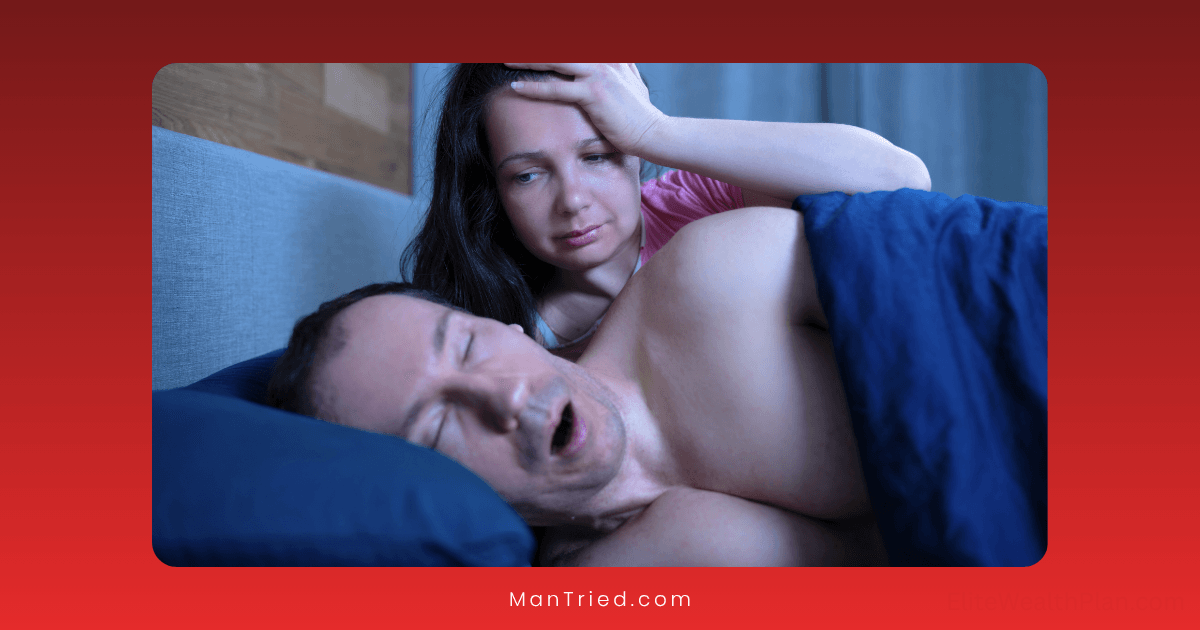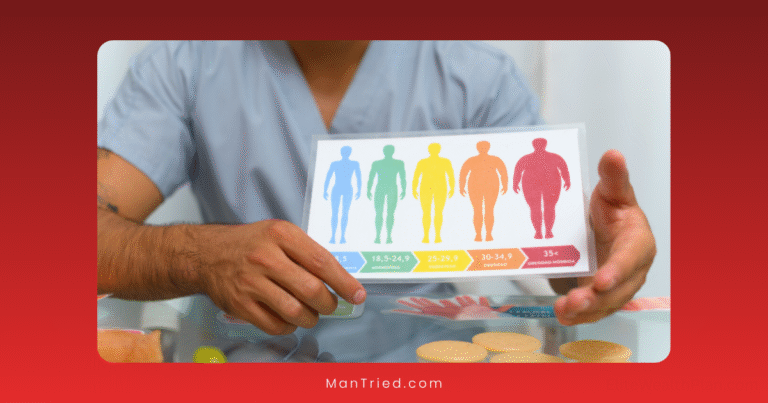Sleep Apnea and ED: The Dangerous Connection Men Ignore

If you’re a man struggling with erectile dysfunction (ED), your doctor has likely discussed common culprits like cardiovascular issues, stress, or low testosterone. But there’s another significant contributor that often flies under the radar: sleep apnea.
This sleep disorder affects millions of men, and research reveals a startling connection—up to 92% of men with obstructive sleep apnea also experience erectile dysfunction, according to the American Sleep Apnea Association. Yet most men never make the connection between their breathing problems at night and their sexual performance issues.
Let’s explore this hidden link and why addressing your sleep might be the key to restoring your sexual health.
The Alarming Statistics You Need to Know
Before diving into the mechanisms connecting these conditions, consider these eye-opening statistics:
- A 2016 study found that 63% of men with sleep apnea experienced ED, compared to 47% of men without the condition.
- In a survey of over 120 men with ED, 55% reported symptoms related to sleep apnea.
- The prevalence of ED in patients with obstructive sleep apnea ranges from 40.9% to 80%, depending on the study.
- By 2025, an estimated 300 million men worldwide will be living with ED, with sleep apnea being a significant contributing factor in many cases.
What’s particularly concerning is that an estimated 24 million Americans have undiagnosed sleep apnea, according to research published in the National Library of Medicine. This means millions of men are treating their ED with medications while ignoring a root cause that continues to damage their health in multiple ways.
Understanding Sleep Apnea: More Than Just Snoring
Obstructive sleep apnea (OSA) occurs when your throat muscles relax during sleep, allowing soft tissue to collapse and block your airway. This causes breathing to repeatedly stop and start throughout the night, sometimes hundreds of times.
Each time your breathing pauses:
- Oxygen levels in your blood drop
- Your brain triggers a brief awakening to restart breathing
- Stress hormones surge
- Your sleep cycle is fragmented
While loud snoring is a common symptom, many men with sleep apnea don’t snore loudly or at all. Other warning signs include:
- Morning headaches
- Excessive daytime sleepiness
- Waking up gasping or choking
- Difficulty concentrating
- Irritability or mood changes
- Witnessed breathing pauses during sleep
The severity of sleep apnea is measured by the Apnea-Hypopnea Index (AHI), which counts how many breathing pauses occur per hour:
- Normal: Less than 5 events per hour
- Mild OSA: 5-14.9 events per hour
- Moderate OSA: 15-29.9 events per hour
- Severe OSA: 30 or more events per hour
Research shows that as the AHI increases, the risk and severity of erectile dysfunction also increase, with one study finding that the odds of having ED increased by 2.8 times for every one-point increase in AHI.
The Biological Pathways: How Sleep Apnea Sabotages Your Sexual Function
Sleep apnea contributes to erectile dysfunction through multiple biological mechanisms:
1. Oxygen Deprivation and Endothelial Dysfunction
Each time breathing stops during sleep, oxygen levels in the blood drop—a condition called intermittent hypoxia. This repeated oxygen deprivation damages the endothelial cells that line blood vessels, including those in the penis.
“Healthy endothelial function is essential for erections, as these cells produce nitric oxide, which relaxes blood vessels and allows increased blood flow,” explains Dr. Michael Eisenberg, Director of Male Reproductive Medicine at Stanford University. “When damaged by repeated oxygen drops, these cells can’t function properly, impairing the erectile process.”
Research published in Respiratory Medicine confirms that men with sleep apnea show markers of endothelial dysfunction that correlate with their erectile difficulties.
2. Testosterone Suppression
Testosterone production follows a circadian rhythm, with levels typically peaking during REM sleep—precisely the sleep stage most disrupted by sleep apnea.
“Normal testosterone production requires quality sleep, particularly REM sleep,” notes Dr. Rachel Salas, Associate Professor of Neurology at Johns Hopkins Medicine. “When sleep apnea fragments sleep and reduces REM, testosterone production suffers.”
Studies have consistently shown lower testosterone levels in men with sleep apnea compared to those without the condition. One study found that the more severe the sleep apnea (as measured by oxygen desaturation), the lower the testosterone levels.
3. Autonomic Nervous System Dysfunction
Sleep apnea triggers hyperactivation of the sympathetic nervous system—your “fight or flight” response—due to repeated breathing emergencies throughout the night.
“Erections require a delicate balance between the sympathetic and parasympathetic nervous systems,” explains urologist Dr. James Ulchaker. “When sleep apnea keeps the sympathetic system in overdrive, it creates a physiological state that inhibits erections.”
This autonomic imbalance persists during waking hours, affecting sexual function even when you’re not sleeping.
4. Chronic Inflammation
The intermittent hypoxia caused by sleep apnea triggers systemic inflammation throughout the body. This inflammatory state damages blood vessels and nerves critical for erectile function.
Research shows elevated inflammatory markers in men with both sleep apnea and ED, with levels correlating to the severity of both conditions.
Beyond Biology: The Psychological Impact
Sleep apnea doesn’t just affect erectile function through physical pathways—it takes a psychological toll as well:
- Fatigue and reduced libido: Chronic sleep deprivation from apnea leaves men too exhausted for sexual activity.
- Mood disorders: Sleep apnea increases the risk of depression and anxiety, both of which contribute to ED.
- Relationship strain: Loud snoring and irritability from poor sleep can create bedroom tension that extends beyond sleep hours.
“The psychological impact of sleep apnea creates a vicious cycle,” explains sex therapist Dr. Emily Sullivan. “Poor sleep leads to low energy and mood problems, which affect sexual desire and performance, creating anxiety about sex that further worsens ED.”
Recognizing the Warning Signs: Could You Have Sleep Apnea?
If you’re experiencing ED, especially if you have any of these risk factors, sleep apnea could be contributing:
- Being overweight or obese (BMI over 25)
- Having a neck circumference greater than 17 inches
- Being over age 40
- Having a family history of sleep apnea
- Experiencing daytime fatigue despite adequate sleep time
- Having high blood pressure or diabetes
The most definitive way to diagnose sleep apnea is through a sleep study (polysomnography), which can be performed in a sleep lab or, increasingly, at home with portable monitoring devices.
According to Frontiers in Endocrinology, the prevalence of sleep apnea with ED was highest in men aged 41-50 (70.59%) and increased with BMI—71.21% in obese men compared to 50% in normal-weight men.
The Treatment Connection: How Addressing Sleep Apnea Can Improve Erectile Function
Here’s the good news: treating sleep apnea often leads to significant improvements in erectile function, sometimes without any additional ED treatments.
CPAP Therapy: The Gold Standard
Continuous Positive Airway Pressure (CPAP) therapy involves wearing a mask during sleep that delivers pressurized air to keep your airway open. It’s considered the gold standard treatment for moderate to severe sleep apnea.
Multiple studies show impressive results for erectile function with CPAP use:
- A study published in the International Journal of Impotence Research found that after just 3 months of CPAP therapy, the mean International Index of Erectile Function (IIEF-5) score improved from 16.63 to 20.92—a statistically significant improvement.
- Another study reported that CPAP therapy resolved ED in 75% of sleep apnea patients, significantly improving quality of life.
“What’s remarkable is how quickly some men respond to CPAP therapy,” notes sleep specialist Dr. Rajkumar Dasgupta. “While it typically takes 1-3 months to see full benefits, some men report improvements in morning erections within just a week of starting treatment.”
Oral Appliance Therapy
For men who can’t tolerate CPAP, oral appliances that reposition the jaw and tongue can be effective for mild to moderate sleep apnea. These devices, fitted by dentists with sleep medicine training, can also improve erectile function.
According to Vivos Therapeutics, oral appliance therapy can significantly improve both sleep apnea and related ED by maintaining airway patency during sleep.
Surgical Options
For appropriate candidates, surgical interventions like uvulopalatopharyngoplasty (UPPP) can address the anatomical causes of sleep apnea. A 2013 pilot study found that men who underwent UPPP experienced significant improvements in erectile function following surgery.
Lifestyle Modifications
For mild cases of sleep apnea, lifestyle changes can make a significant difference:
- Weight loss: Even modest weight reduction can improve both sleep apnea and erectile function.
- Positional therapy: Sleeping on your side rather than your back can reduce apnea events.
- Alcohol reduction: Avoiding alcohol before bedtime improves sleep breathing.
- Regular exercise: Physical activity improves sleep quality and erectile function.
Real Success Stories: Men Who Made the Connection
James, 52: “I’d been taking ED medications for three years with decreasing effectiveness when my wife insisted I get checked for sleep apnea because of my snoring. After two months of CPAP therapy, I was able to achieve erections without medication for the first time in years. My doctor explained that the oxygen drops from apnea had been damaging the blood vessels in my penis.”
Michael, 47: “I never connected my fatigue and ED until my doctor suggested a sleep study. My AHI was 38—severe sleep apnea. Within six weeks of starting CPAP, not only did my energy return, but my testosterone level increased from 270 to 425ng/dL, and my erectile function improved dramatically.”
Robert, 61: “After struggling with ED that didn’t respond well to medications, I was diagnosed with moderate sleep apnea and started using an oral appliance. Within three months, my morning erections returned, and my overall erectile function improved enough that I rarely need medication now.”
Taking Action: What to Do If You Suspect a Connection
If you’re experiencing ED and suspect sleep apnea might be contributing, here are practical steps to take:
- Talk to your doctor about a sleep evaluation. Mention both your ED and any sleep symptoms.
- Consider home screening. Many healthcare providers now offer home sleep apnea tests as an initial screening tool.
- Complete a sleep apnea risk assessment. Tools like the STOP-BANG questionnaire can help assess your risk.
- Discuss treatment options if diagnosed. Work with your doctor to find the most appropriate sleep apnea treatment based on the severity of your condition and your preferences.
- Be patient with treatment. While some men see rapid improvements in erectile function, it typically takes 1-3 months of consistent sleep apnea treatment to experience maximum benefits.
- Address other ED risk factors simultaneously. Improving cardiovascular health, reducing stress, and maintaining a healthy weight will enhance results.
The Bottom Line
The connection between sleep apnea and erectile dysfunction represents both a challenge and an opportunity. While sleep apnea can significantly contribute to ED through multiple biological pathways, treating this sleep disorder often leads to substantial improvements in sexual function—sometimes eliminating the need for ED medications entirely.
If you’re among the millions of men struggling with erectile dysfunction, especially if you have risk factors for sleep apnea, discussing this connection with your healthcare provider could be the key to addressing not just the symptoms but a root cause of your sexual health concerns.
Don’t ignore the snore—it might be telling you more about your health than you realize.
Have you experienced improvements in erectile function after treating sleep apnea? Share your experience in the comments below.






